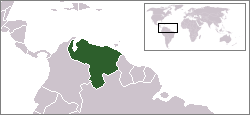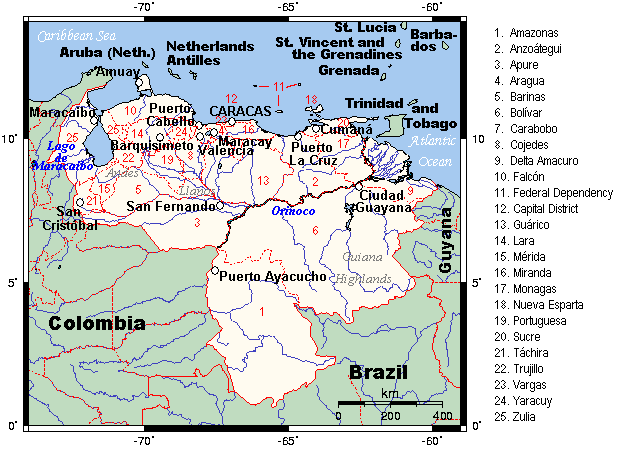Venezuela
The Bolivarian Republic of Venezuela (Spanish: República Bolivariana de Venezuela)1 is a country in northern South America.2 It borders the Caribbean Sea and the Atlantic Ocean to the north, Guyana to the east, Brazil to the south, and Colombia to the west. Off the Venezuelan coast are also found the Caribbean states of Aruba, the Netherlands Antilles and Trinidad and Tobago.
| ||||
| National motto: none | ||||

| ||||
| Official language | Castilian (Spanish) | |||
| Capital | Caracas | |||
| President | Hugo Chávez | |||
| Area - Total - % water |
Ranked 32nd 912,050 km² 0.3% | |||
| Population - Total (2002) - Density |
Ranked 43rd 24,287,670 27/km² | |||
| Independence - Declared - Recognised |
From Spain July 5, 1811 1821 | |||
| Currency | Venezuelan bolívar | |||
| Time zone | UTC -4 | |||
| National anthem | Gloria al Bravo Pueblo | |||
| Internet TLD | .ve | |||
| Calling Code | 58 | |||
History
Main article: History of Venezuela
Venezuela was the site of one of the first permanent Spanish settlements in South America in 1522, being the first one Santa Marta in what is now Colombia, and most of the territory eventually became part of the viceroyalty of New Granada. Parts of what is now eastern Venezuela became New Andalusia. After several unsuccessful uprisings, the country achieved independence from Spain in 1821 under the leadership of its most famous son, Simón Bolívar. Venezuela, along with what are now Colombia, Panama, and Ecuador, was part of the Republic of Greater Colombia (Gran Colombia) until 1830, when Venezuela separated and became a sovereign republic.
Much of Venezuela's 19th and early 20th century history was characterized by periods of political instability, dictatorial rule, and revolutionary turbulence. Following the military's withdrawal from direct involvement in national politics in 1958, Venezuela has enjoyed an unbroken tradition of democratic civilian rule, though not without conflict. In 1992, there was an attempt by rebellious entities within the Venezuelan military, lead by Lieutenant Colonel Hugo Chávez, to remove two-time president Carlos Andrés Pérez from power. The coup tried to remove the democratically elected, albeit corrupt, Pérez who was accused by members of the Venezuelan congress of misappropriation of funds. The coup ultimately failed, and Chávez and his co-conspirators were jailed for treason. Perez, on the other hand, was eventually impeached and convicted for corruption. The coup brought about the death of 80 civilians and 17 members of the armed forces. Chávez's role in resisting the corrupt president made him a prominent figure among Venezuela's underclass. Chávez was eventually released from jail in 1994 by Perez's elected successor, Rafael Caldera.
Chávez was elected president in 1998 with 56% of the vote as part of a new political party, the Movement for the Fifth Republic. His platform called for the signing of a new constitution, which was written by a Constituent Assembly and approved by referendum in 1999. Chávez was re-elected in 2000 under the new constitution with 59% of the vote. In November 2000, the National Assembly granted Chávez the right to rule by decree for one year, and in November 2001, Chávez made a set of 49 decrees, including large reforms in oil and agrarian policy. Chávez has since faced considerable opposition and a polarized country. In December 2001, the nation's largest business and labor union organizations attempted to organize a general strike. In 2002, military and popular opposition elements removed Chávez from power and briefly installed Pedro Carmona Estanga as president of Venezuela. Due to a subsequent popular uprising, with support from the rank and file members of the military, Pedro Carmona was forced to resign. Diosdado Cabello, Vice President of Venezuela, became president as dictated by the constitution. Chávez was restored to power in 48 hours. A recall referendum was held on August 15, 2004, which Chávez won with approximately 58% of the vote. The fairness of the vote has been disputed by all elements of the political opposition. The recall referendum was summarily certified by the Organization of American States and the Carter Center.
Venezuela is member of the South American Community of Nations (SACN).
See also: Discoverer of the Americas
Politics
Main article: Politics of Venezuela
The Venezuelan president is elected by a plural vote, with direct and universal suffrage, and functions as both head of state and head of government. The term of office is 6 years, and a president may be re-elected to a single consecutive term. The president appoints the vice-president and decides the size and composition of the cabinet and makes appointments to it with the involvement of the legislature. The president can ask the legislature to reconsider portions of laws he finds objectionable, but a simple parliamentary majority can override these objections.
The unicameral Venezuelan parliament is the National Assembly or Asamblea Nacional. Its 165 deputies, of which three are reserved for indigenous peoples, serve 5-year terms and may be re-elected for a maximum of two additional terms. They are elected by popular vote through a combination of party lists and single member constituencies. The highest judicial body is the Supreme Tribunal of Justice or Tribunal Supremo de Justicia, whose magistrates are elected by parliament for a single 12-year term. The Consejo Nacional Electoral is in charge of electoral processes; it is formed by five main directors elected by the National Assembly.
See also
States

Main article: States of Venezuela
Venezuela is subdivided into 23 states (estados), one capital district (distrito capital) and one federal dependency (dependencia federal), marked by a *:
- Amazonas
- Anzoátegui
- Apure
- Aragua
- Barinas
- Bolívar
- Carabobo
- Cojedes
- Delta Amacuro
- Falcón
- Federal Dependency *
- Capital District *
- Guárico
- Lara
- Mérida
- Miranda
- Monagas
- Nueva Esparta
- Portuguesa
- Sucre
- Táchira
- Trujillo
- Vargas
- Yaracuy
- Zulia
Geography
Main article: Geography of Venezuela
Venezuela is home to a wide variety of landscapes, such as the northeasternmost extensions of the Andes mountains in the northwest and along the northern Caribbean coast, of which the highest point is the Pico Bolivar at 5,007 m. Also found in the northwest are the lowlands around Lake Maracaibo and the Gulf of Venezuela. The centre of the country is characterised by extensive plains known as the llanos that stretch from the Colombian border to the river delta of the Orinoco east. To the south are found the dissected Guiana Highlands, home to Angel Falls, the world's highest waterfall.
The local climate is tropical and generally hot and humid, though more moderate in the highlands. The capital, Caracas is also the country's largest city. Other major cities include Maracaibo, Barquisimeto, Valencia, Maracay, and Ciudad Guayana.
Economy
Main article: Economy of Venezuela
Demographics
Main article: Demographics of Venezuela
The Venezuelan people comprise a rich combination of heritages. The historically present Amerindians, Spanish colonists and Africans were joined by Italians, Portuguese, Arabs, Germans, and others from neighbouring countries in South America during waves of immigration in the 20th century. About 85% of the population live in urban areas in the northern portion of the country. While almost half of Venezuela's land area lies south of the Orinoco river, this region contains only 5% of the population.
The national and official language is Spanish, but numerous indigenous languages also exist (Guajiro, Pemon, Warao, etc), as do dialects introduced by immigrants. Nominally 96% of the population is Roman Catholic; other denominations, primarily Protestants, make up the remainder.
List of Venezuelans
National Symbols
Among the venezuelan national symbols, should be counted the flag, the coat of arms, and the national anthem. It is remarkable other elements relative to the typical flora and fauna of the country, that the government, through history, has officially declared as national symbols, such as the National Flower (the orchid), the National Tree (the aragüaney), and the National Bird (the turpial).
Gastronomy
Main dishes:
- Hallaca
- Pabellón criollo (Creole pabillion)
- Cachapa (Corn tortilla).
- Chivo en coco (Goat meat with coconut).
- Pisillo de chigüire
- Asado negro
- Mondongo (Tripe).
- Bollo pelón
Typical Snacks:
- Arroz con coco (Rice with coconut).
- Arepa
- Tequeño
- Tostón
Typical Candies:
Notes
1 The Bolivarian Republic of Venezuela has been the full official title of the state since the adoption of the 1999 constitution, when the state was renamed in honour of Simón Bolívar.
2 The name Venezuela, meaning "Little Venice," is due to the Amerindian stilt villages that reminded Amerigo Vespucci of Venice when he explored the Lake Maracaibo.
See also
External links
- Gobierno en Línea - Official governmental portal (in Spanish)
- Presidencia de la República de Venezuela - Official Presidential Site (in Spanish)
- Asamblea Nacional - Official Parliamentary Site (in Spanish)
- Hugo Chávez Frias' Landslide Victory
- Venezuelanalysis.com
- Venezuela Banknotes
- Efemérides Venezolanas (in spanish).
- Venezuela in Photographs (in Spanish)
- Venezuela's News Channel
- One of Venezuela's Radio Network
- Venezuela's Electronic News
- Diario El Universal
- Government of Ramón J. Velásquez
- Letter from Venezuela
